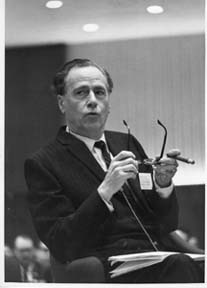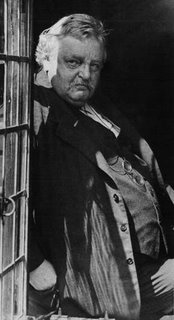McLuhan on Chesterton
 All profound truth, philosophical and spiritual, makes game with appearances, yet without really contradicting common sense. That is why Mr. Chesterton accuses the Victorians of believing in real paradoxes, such as expecting all men to have the same morals when they have different religions, or supposing that it was practical to be illogical. A little attention shows how he consciously causes a clash between appearances in order to attract attention to a real truth transcending such a conflict. There is no hint or hue of meaning amidst the dizziest crags of thought that is safe from his swift, darting, pursuit. We return safely and lucidly from the exhilarating chase of an idea to its logical conclusion. Such a world, rigid with thought and brilliant with colour, is the very antithesis of the pale-pink lullaby-land of popular science. It is the difference between a cathedral window and blank infinity. That is why modern life, thoughtless and unpoised, has degenerated from a dance into a race, and history is regarded as a toboggan slide. But Mr. Chesterton has exposed the Christless cynicism of the supposedly iron laws of economics and shown that history is a road that must often be reconsidered and even retraced. For, if Progress implies a goal, it does not imply that all roads lead to it inevitably. And today, when the goal of Progress is no longer clear, the word is simply an excuse for procrastination.
All profound truth, philosophical and spiritual, makes game with appearances, yet without really contradicting common sense. That is why Mr. Chesterton accuses the Victorians of believing in real paradoxes, such as expecting all men to have the same morals when they have different religions, or supposing that it was practical to be illogical. A little attention shows how he consciously causes a clash between appearances in order to attract attention to a real truth transcending such a conflict. There is no hint or hue of meaning amidst the dizziest crags of thought that is safe from his swift, darting, pursuit. We return safely and lucidly from the exhilarating chase of an idea to its logical conclusion. Such a world, rigid with thought and brilliant with colour, is the very antithesis of the pale-pink lullaby-land of popular science. It is the difference between a cathedral window and blank infinity. That is why modern life, thoughtless and unpoised, has degenerated from a dance into a race, and history is regarded as a toboggan slide. But Mr. Chesterton has exposed the Christless cynicism of the supposedly iron laws of economics and shown that history is a road that must often be reconsidered and even retraced. For, if Progress implies a goal, it does not imply that all roads lead to it inevitably. And today, when the goal of Progress is no longer clear, the word is simply an excuse for procrastination.It is scarcely necessary now, when philosophy and art have been revitalized by the study of medieval achievements, to explain that Mr. Chesterton does not want "to go back to the middle ages," and never did. "There is none rides back to pick up a glove or a feather." But the merest reference to anything prior to the Reformation starts a clockwork process in the mind of the nineteenth-century journalists who still write most of our papers: "Mr. Chesterton is a medievalist; and he is therefore quite justified (from his own benighted standpoint) in indulging as he does in the sport of tearing out the teeth of Jews, burning hun
 dreds of human beings alive, and perpetually seeking after the Philosopher's Stone." Without these automatic and irresponsible reactions to anything resembling serious thought, there could not be that vast and increasing mountain of printed paper which indicates that progress is proceeding. For, as Stevenson noted, man does not live by bread alone, but by catchwords also. It all began with Luther's anathemas against Reason, and Descartes's expressed contempt for Aristotle and Aquinas.
dreds of human beings alive, and perpetually seeking after the Philosopher's Stone." Without these automatic and irresponsible reactions to anything resembling serious thought, there could not be that vast and increasing mountain of printed paper which indicates that progress is proceeding. For, as Stevenson noted, man does not live by bread alone, but by catchwords also. It all began with Luther's anathemas against Reason, and Descartes's expressed contempt for Aristotle and Aquinas.Marshall McLuhan "G.K. Chesterton: A Practical Mystic"




<< Home